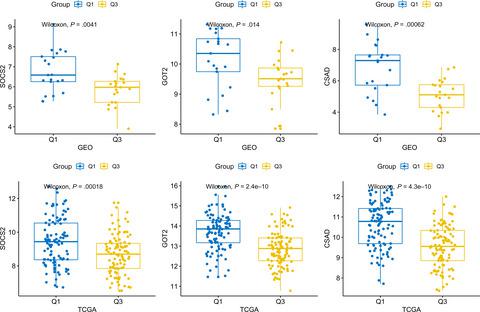当前位置:
X-MOL 学术
›
Cancer Med.
›
论文详情
Our official English website, www.x-mol.net, welcomes your feedback! (Note: you will need to create a separate account there.)
Identification of three m6A-related mRNAs signature and risk score for the prognostication of hepatocellular carcinoma.
Cancer Medicine ( IF 4 ) Pub Date : 2020-01-13 , DOI: 10.1002/cam4.2833 Zedong Li 1 , Fazhan Li 2 , Yu Peng 1 , Jianyu Fang 3 , Jun Zhou 1
Cancer Medicine ( IF 4 ) Pub Date : 2020-01-13 , DOI: 10.1002/cam4.2833 Zedong Li 1 , Fazhan Li 2 , Yu Peng 1 , Jianyu Fang 3 , Jun Zhou 1
Affiliation

|
Hepatocellular carcinoma (HCC) is the most common type of liver cancer and is extremely harmful to human health. In recent years, N6-methyladenosine (m6A) RNA methylation in eukaryotic mRNA has been increasingly implicated in cancer pathogenesis and prognosis. In this study, we downloaded the expression profile and clinical information of 307 patients from The Cancer Genome Atlas database and 64 patients from the Gene Expression Omnibus (GEO) database, and univariate Cox analysis revealed that METTL14 was a prognostic m6A RNA methylation regulator. For further study on the related genes of METTL14, weighted gene co-expression network analysis was used to find the relationship between METTL14 and gene expression, and univariate Cox analysis and least absolute shrinkage and selection operator (LASSO) methods were used to identify hub genes that may be associated with HCC prognosis. The results indicated that cysteine sulfinic acid decarboxylase, glutamic-oxaloacetic transaminase 2, and suppressor of cytokine signaling 2 were key genes affecting the prognosis of HCC patients, and m6A methylation of these mRNAs may be regulated by METTL14. Finally, a nomogram was constructed based on the hub gene expression levels, and its prediction accuracy and discriminative ability were measured by the C-index and a calibration curve. In conclusion, METTL14, an m6A RNA methylation regulator, may participate in the malignant progression of HCC by adjusting the m6A of cysteine sulfinic acid decarboxylase, glutamic-oxaloacetic transaminase 2, and suppressor of cytokine signaling 2, and these genes are useful for prognostic stratification and treatment strategy development.
中文翻译:

鉴定三个 m6A 相关 mRNA 特征和用于预测肝细胞癌预后的风险评分。
肝细胞癌(HCC)是最常见的肝癌类型,对人类健康危害极大。近年来,真核生物 mRNA 中的 N6-甲基腺苷 (m6A) RNA 甲基化越来越多地参与癌症的发病机制和预后。在这项研究中,我们从癌症基因组图谱数据库下载了 307 名患者和基因表达综合 (GEO) 数据库中 64 名患者的表达谱和临床信息,单变量 Cox 分析显示 METTL14 是一种预后 m6A RNA 甲基化调节剂。为进一步研究 METTL14 的相关基因,采用加权基因共表达网络分析寻找 METTL14 与基因表达的关系,和单变量 Cox 分析以及最小绝对收缩和选择算子 (LASSO) 方法用于识别可能与 HCC 预后相关的中心基因。结果表明,半胱氨酸亚磺酸脱羧酶、谷氨酸-草酰转氨酶 2 和细胞因子信号抑制基因 2 是影响 HCC 患者预后的关键基因,这些 mRNA 的 m6A 甲基化可能受 METTL14 调控。最后,基于hub基因表达水平构建列线图,并通过C-index和校准曲线衡量其预测准确性和判别能力。综上所述,m6A RNA 甲基化调节因子 METTL14 可能通过调节半胱氨酸亚磺酸脱羧酶、谷氨酸-草酰乙酸转氨酶 2、
更新日期:2020-01-14
中文翻译:

鉴定三个 m6A 相关 mRNA 特征和用于预测肝细胞癌预后的风险评分。
肝细胞癌(HCC)是最常见的肝癌类型,对人类健康危害极大。近年来,真核生物 mRNA 中的 N6-甲基腺苷 (m6A) RNA 甲基化越来越多地参与癌症的发病机制和预后。在这项研究中,我们从癌症基因组图谱数据库下载了 307 名患者和基因表达综合 (GEO) 数据库中 64 名患者的表达谱和临床信息,单变量 Cox 分析显示 METTL14 是一种预后 m6A RNA 甲基化调节剂。为进一步研究 METTL14 的相关基因,采用加权基因共表达网络分析寻找 METTL14 与基因表达的关系,和单变量 Cox 分析以及最小绝对收缩和选择算子 (LASSO) 方法用于识别可能与 HCC 预后相关的中心基因。结果表明,半胱氨酸亚磺酸脱羧酶、谷氨酸-草酰转氨酶 2 和细胞因子信号抑制基因 2 是影响 HCC 患者预后的关键基因,这些 mRNA 的 m6A 甲基化可能受 METTL14 调控。最后,基于hub基因表达水平构建列线图,并通过C-index和校准曲线衡量其预测准确性和判别能力。综上所述,m6A RNA 甲基化调节因子 METTL14 可能通过调节半胱氨酸亚磺酸脱羧酶、谷氨酸-草酰乙酸转氨酶 2、



























 京公网安备 11010802027423号
京公网安备 11010802027423号